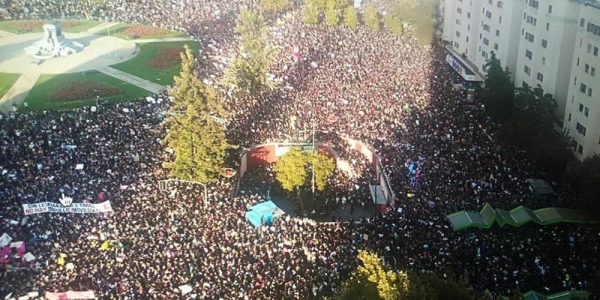
The 8M march mobilized around 400 thousand people on the streets of Santiago, while nationally the numbers were doubled. This is the response of women to the international call of the feminist strike, in which global massiveness marked the day. Since last year, the conformation and development of the 8M Feminist Coordination has created a program, discussed with over a thousand women in the Multinational Meeting of Women in Struggle, organized in over 50 previous meetings, with key points against the precariousness of life. This organizational preamble decided to call the strike, an unprecedented success in the recent history of our country, since the strike as a basic right of working people was forbidden by the dictatorship, a policy perpetuated by the governments of the former Nueva Mayoria and the right. This 8M didn’t just include a productive strike, but also broadened the call to strike on housework and care, a process led by women for the recognition of the unpaid labor that sustains social life, a key point of a feminist political change that has been a synonym of mobilization in the last few years, against femicides in 2016, against sexist education and the right to abortion during 2018.
if these last years have been a response to the rising instability of life, what 8M shows is the power of the storming of the present with a transformative policy with programmatic proposals, posing new challenges and opportunities for the left with anti-capitalist horizons.
Against the right that imposes precarization, an anti-capitalist feminist antidote
Without a doubt, the public agenda in the previous and following days to 8M was owned by feminism, forcing every sector to take a position in the face of the massive diffusion of the call to the strike. The government tried to discredit the call and, according to its interests, attacked it; the minister of Women and Gender Equality Isabel Pla said “it distracts people from the main problems… it would be unfortunate for the most felt demands of Chilean women to become a banner of politicized struggle”, following the words of Piñera: “we don’t need strikes for the government to completely assume its compromise to achieve that equality”.
The anti-strike discourse focus changed after the historical march, forcing the minister and Piñera to regulate their words. This proves the potential expressed on the streets; in first place, due to the powerful turn out, which makes 8M one of the most massive marches since the dictatorship, forcing the Executive power to make discursive acrobatics, while the program defended by the 8M Feminist Coordination marked the return of the possibility of once again discussing key elements against the pillars of the regime: a new social security that recognizes unpaid work, labor rights, reproductive rights and health care rights, among others in the ten point manifesto. This means taking the idea that political discussion is only possible within neo-liberalism out of social consciousness, unlike what the institutional left says.
While the size of the march showed the rise of this wave, we still have the limits of the bureaucratic leaderships. The Communist Party, with Barbara Figueroa, didn’t call for an effective strike through the CUT, while other unions didn’t fight to advance against the right. Something similar happened with the Broad Front (FA) last year during the feminist mobilizations. While the green handkerchiefs popularized, the FA together with the former Nueva Mayoria designed a bill to decriminalize the interruption of pregnancies, diminishing and limiting the demand of the mobilization for legal, safe and free abortion, which was left suspended in Congress. The same thing happened with the university occupations against sexist education, when they focused merely on parliamentary committees. These actions outside the mobilization and focused on institutional agreements are the reason that Piñera has governed without political opposition. Contrary to this logic, social mobilization has shown that there is strength to stop the measures of the right wing, that is trying to impose precarization.
After 8M. From feminism, the left shifts to the class struggle
The response to the call was overwhelming, opening up a post 8M scenario hat implies enormous challenges and responsibilities. The first is to continue strengthening the 8M Feminist Coordination, where the anti-capitalist left organizations must meet and promote the unity of the feminism for the 99%, continue with the promotion of a process that has the responsibility of having increased the flow of the feminist strike under a political program.
In second place, the increasing flow we’re living must not be wasted, the social unrest and the strength on the streets are the support of the resistance to the policies promoted by the government that impose precarization on working people; that is why the anti-system power that is expressed in feminism must find in its transformative will a total critique that also has proposals, while advancing in the construction of a new political alternative, completely different from what we previously know. That is part and consequence of the positive accumulation on the streets, without replacing social movements, with a strong presence that is capable of disputing and discussing a feminist and anti-capitalist proposal everywhere, without space for soft positions on the policies that try to speak in our name. To stop the right, we must turn everything upside down.
Juntas a La Izquierda – Chile
Movimiento Anticapitalista.








